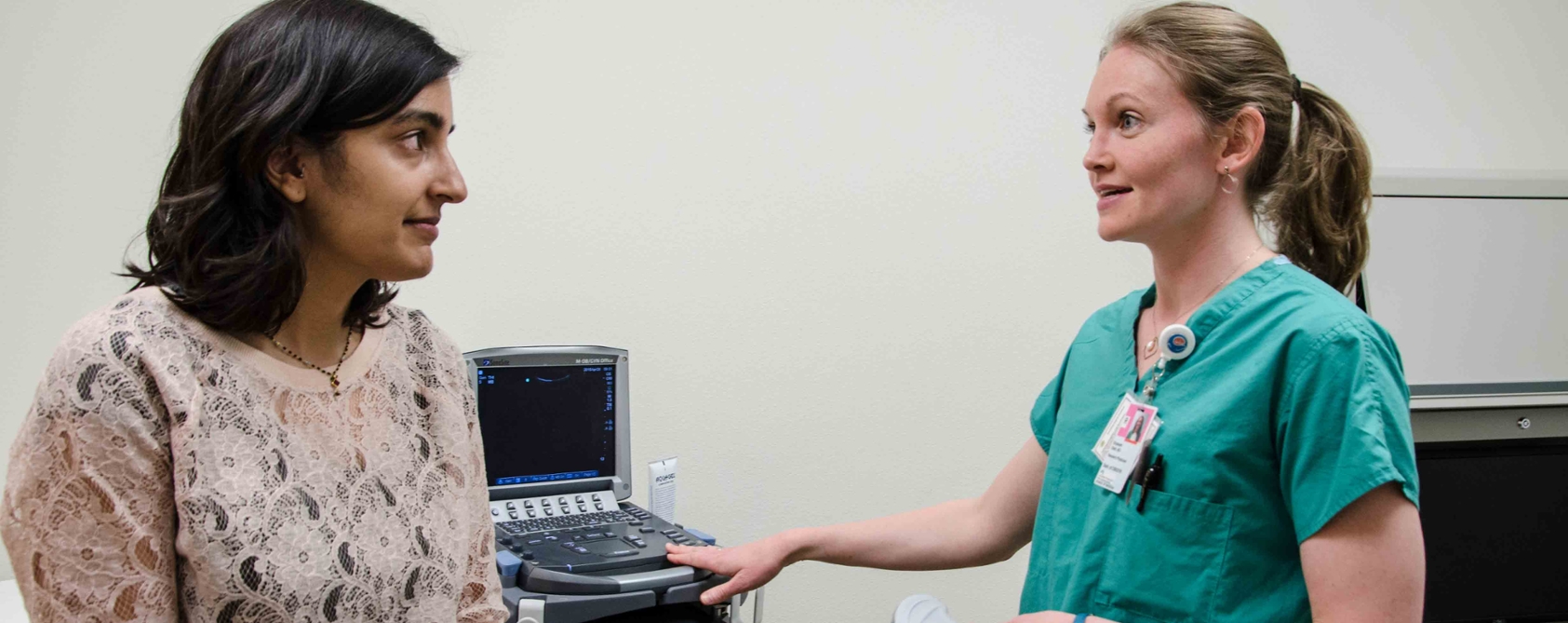Urogynecology
Millions of women suffer from urinary leakage, pelvic prolapse, and bowel disorders—you are not alone! Turn to UNM Health System’s board certified urogynecologists and certified advanced practice providers for compassionate women’s health care.
Our team of expert urogynecologists is committed to improving your quality of life and helping you regain control and confidence. With a patient-centered approach, state-of-the-art facilities, and a multidisciplinary team, we are here to support you every step of the way on your journey to wellness.
What is a urogynecologist?
A urogynecologist, or urogyn, receive special training to diagnose and treat women with pelvic floor disorders. You may have a primary care physician, OB/GYN, or urologists who helps manage your pelvic floor disorders, however, a urogynecologist can offer additional expertise. Talk with your doctor about a referral to a urogyn if you have problems of prolapse, and/or troublesome urinary or fecal incontinence. Or, if you have problems with emptying the bladder or rectum, pelvic pain or bladder pain, fistulas.
What conditions do we treat?
At the University of New Mexico Division of Urogynecology, we specialize in the diagnosis and treatment of various pelvic floor disorders. These include the following:
- Pelvic organ prolapse: when organs in the pelvis, such as the bladder, uterus, or rectum, shift or drop from their normal positions, causing discomfort or a bulging sensation.
- Leakage of urine (Urinary Incontinence): When you have little control over your bladder and experience unexpected leakage of urine, such as when coughing, sneezing, or laughing or unable to make it to the bathroom on time.
- Leakage of stool (Fecal incontinence): When you have difficulty controlling bowel movements, resulting in unexpected leakage or accidents.
- Overactive bladder: When your bladder muscles contract more frequently than usual, causing a sudden and strong urge to urinate even if the bladder is not full.
- Difficulty emptying: When you have trouble completely emptying your bladder or bowel, leading to a feeling of incomplete voiding or straining during urination or bowel movements.
- Bladder Pain Syndrome (Interstitial Cystitis): A condition characterized by chronic pain or discomfort in the bladder region, often accompanied by a frequent need to urinate and a sense of urgency.
- Fistulas (vesicovaginal or rectovaginal): Abnormal connections or openings that develop between the bladder and vagina or the rectum and vagina, resulting in urine or stool leakage through the vagina.
- Management of vaginal and pelvic mesh complications: Involves addressing issues related to surgical mesh used to support the pelvic organs, including pain, discomfort, or mesh erosion.
How do we diagnose these conditions?
Accurate diagnosis is crucial in developing an effective treatment plan. Our experienced urogynecologists utilize a comprehensive approach to diagnose pelvic floor disorders. This may involve a thorough medical history review, physical examination, urodynamic testing, imaging studies, and specialized procedures such as cystoscopy or urodynamics. Our goal is to understand your unique situation and provide you with an accurate diagnosis to guide your treatment.
Additionally, at UNM, our urogynecologists collaborate with a world-renowned expert in pelvic ultrasound. With access to advanced technologies such as 3-D ultrasound, Doppler, and other modalities, we can generate detailed images of your organs and pelvic region. These state-of-the-art diagnostic tools enable us to precisely identify and treat pelvic disorders, ensuring comprehensive care that goes beyond conventional methods. By leveraging this invaluable resource, we are dedicated to delivering accurate diagnoses and effective treatments that may uncover and address pelvic conditions that might otherwise be overlooked..
What treatments are available?
We offer a wide range of treatment options to address your pelvic floor disorder. Our approach is individualized and considers your specific symptoms, lifestyle, and preferences. Treatment options may include conservative therapies such as pelvic floor physical therapy, behavioral modifications, and medication. For more complex cases, surgical interventions such as minimally invasive procedures or reconstructive surgery may be recommended. Rest assured, our team will work closely with you to determine the most appropriate and effective treatment plan for your needs.
Our non-surgical treatment options include the following:
- Pelvic Floor Muscle Training: This involves exercises to strengthen and coordinate the muscles of the pelvic floor, which can help improve bladder and bowel control.
- Behavioral and Lifestyle Modifications: Urogynecologists may recommend changes in daily habits, such as dietary modifications, fluid management, and timed voiding techniques, to address symptoms of urinary or fecal incontinence.
- Medications: Certain medications can be prescribed to manage symptoms associated with pelvic floor disorders, such as overactive bladder or bladder pain syndrome.
- Pelvic Floor Physical Therapy: This specialized therapy involves hands-on techniques, exercises, and biofeedback to improve muscle function, alleviate pain, and optimize pelvic floor health.
- Pessary Insertion: A pessary is a removable device inserted into the vagina to provide support for pelvic organs in cases of pelvic organ prolapse.
- Nerve Stimulation Therapies: Techniques like percutaneous tibial nerve stimulation may be used to modulate nerve activity and improve bladder control.
- Botox Injections: In some cases, Botox injections may be administered to relax overactive muscles in the bladder, reducing urinary urgency and frequency. In some cases, we may administer Botox injections for patients with pelvic floor myalgia
- Bladder Instillations: A treatment option for IC/PBS, that involves filling the bladder with a solution, leaving it in place for a short period of time, and then draining the solution.
- Counseling and Behavioral Therapy: Urogynecologists may refer patients to counselors or therapists who specialize in pelvic floor disorders to provide support, guidance, and coping strategies.
Our surgical treatment options include the following:
- Pelvic Organ Prolapse Repair: Surgical procedures to restore the normal position and support of pelvic organs, such as the bladder, uterus, or rectum, which may involve the use of native tissues or synthetic mesh. We additionally provide the option for patients who desire to keep their uterus but still receive a prolapse repair (also known as hysteropexy).
- Midurethral Sling Placement: A minimally invasive procedure to treat stress urinary incontinence by supporting the urethra with a sling made of synthetic mesh or tissue.
- Bladder Neck Suspension: Surgery to correct urinary incontinence by supporting the bladder neck and urethra to improve control and reduce leakage.
- Urethral bulking treatments: A procedure which bulking agents are injected into the walls of the urethra to help close the sphincter.
- Fistula Repair: Surgical repair of abnormal openings, such as vesicovaginal (between bladder and vagina) or rectovaginal (between rectum and vagina) fistulas, to restore normal urinary or bowel function.
- Sacroneuromodulation Therapy: Placement of a small device near the sacral nerves to provide neuromodulation and improve symptoms of overactive bladder or urinary retention.
- Robotic-Assisted Surgery: Utilizing robotic surgical systems to perform complex pelvic surgeries with enhanced precision and minimal invasiveness.
- Vaginal Reconstructive Surgery: Procedures to repair or reconstruct the vaginal canal, addressing specific anatomical or functional issues.
It's important to remember that the treatments recommended will depend on the individual patient's diagnosis, symptoms, and overall health. Urogynecologists will evaluate each patient's unique circumstances and develop a personalized treatment plan to address their specific needs.
What research studies can you participate in?
The Division of Urogynecology prides itself in actively participate in cutting-edge research to advance the field of urogynecology and improve patient outcomes. We offer opportunities for eligible patients to participate in research studies and clinical trials, giving you access to innovative treatments and the chance to contribute to medical advancements. Your participation can make a difference not only in your own care but also for future generations of women facing similar conditions. We invite you to explore our research participation opportunities and join us in shaping the future of urogynecologic care.
Where can I find more information?
To learn more about your pelvic floor disorder and treatment options, you may be interested in the following websites:
- https://www.voicesforpfd.org/
- https://www.yourpelvicfloor.org/
- https://www.niddk.nih.gov/health-information/urologic-diseases
- https://medlineplus.gov/pelvicfloordisorders.html
- https://medlineplus.gov/urinaryincontinence.html
Stay connected and join our community by following our Instagram @unm_urogynecology. We share educational content, awareness campaigns, and updates on the latest advancements in urogynecology. Get to know us and follow us on Instagram today and embark on a journey towards optimal pelvic health together!
Our Locations:
UNM Women’s Health Center
2130 Eubank Blvd NE
Albuquerque, NM 87112
Phone: 505-272-2245
Sandoval Regional Medical Center
3200 Broadmoor Blvd
2nd Floor, Orthopedic Center of Excellence Building
Rio Rancho, NM 87144
Phone: 505-994-7397
Our Mission & Future Vision
As the Division of Urogynecology, we are committed to providing exceptional care to women with pelvic floor disorders. We strive to deliver safe, effective, and compassionate treatment that empowers our patients to take an active role in their health. Our team of fellowship-trained physicians, experienced staff, and dedicated researchers work together to ensure that our patients receive the best possible care.
Our vision is to be the leading center for the prevention, diagnosis, and treatment of pelvic floor disorders. We will achieve this by providing high-quality care, conducting groundbreaking research, and offering unparalleled educational opportunities to our staff and trainees. We believe that a welcoming and supportive environment leads to satisfied patients and fulfilled employees, and we are committed to fostering a culture of collaboration, innovation, and excellence.
Make an Appointment
To schedule a urogynecology appointment, call us at 505-272-2245.



